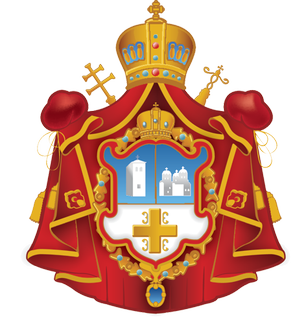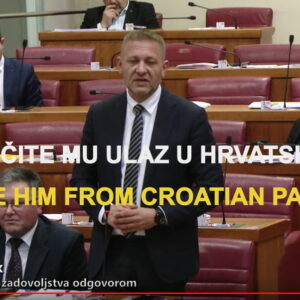As noted by Alexis de Tocqueville in his, Démocratie en Amérique, religions and democracy make uneasy bedfellows. “Democracy destroys the bonds of community through its never-ending quest for freedom and equality – at the same time, it also destroys religion.”
Ironically, in part, thanks to liberalism and democracy in the US at least, the exact opposite has happened.
However across the globe, it’s the least liberal religions that are the first to crumble under the onslaught of democratic political deed and thought. And one of the least liberal Christian religions is the Serbian Orthodox Church or SPC.
While most of the Orthodox world has eagerly embraced the move to democracy, says historian Marko Vekovic from the University of Belgrade: “The relationship between [Serbian] Orthodox Christianity and democracy is rather complex.”
Founded by Saint Sava in 1219, the SPC reached the zenith of its development under the tutelage of the Ottoman Empire i.e., under the auspices of another, even less liberal religion, Islam.
At times, the SPC was used as an imperial enforcer of the Sultan in order to keep order amongst other Christians in the empire, like in the case of Bosnia during the 17th and 18th centuries. At other times, it granted itself near-royal authority to force many others, like Croatian Catholics in Vojvodina and Herzegovina, to become Serbian Orthodox, usually at the point of a sword.
For some 500 years, the SPC was guided by the suffocating and over-bearing presence of the Turkish Sultan. After Serbia broke free of its Ottoman yoke in 1878, it went straight into the arms of another autocratic regime, the Hapsburg Empire.
In historical terms, democracy was never in the SPC’s DNA.
While the Roman Catholic Church’s (RCC) leadership was forced to open up its theology under the influence of Protestant Reformers, the SPC on the other hand had no such pressure applied to its teachings.
In fact at the same time as the Ottomans installed the uber-fanatical Greek Phanariot priests at its head, Roman Catholic excesses were being tempered and at times even reversed by Protestant individualism and free thought, while in the East, the SPC was retreating even further into a Dark Ages-style backwardness and insularity.
The 20th Century did nothing to ameliorate this trend to social regression.
According to Boris Begović, professor of economics at the School of Law, University of Belgrade, at the beginning of 20th century, [Serbian] “Orthodox Christianity was not a barrier to liberal democracy in Serbia: rather, it was the other way around. In other words, he says, a robust and viable democracy was a barrier to Orthodoxy.”
So, after the establishment of the first Yugoslavia in 1918, which was an autocratic monarchy, the SPC actually thrived and was expanded by the Serb-run monarchy to forcibly incorporate all those in the new country that were Orthodox, regardless of whether or not they were ethnic Serbs.
In effect, the SPC once again, like under the Ottomans centuries before, acted (and thrived) as the enforcer of a dictatorial and non-democratic regime.
According to Serbia’s Women in Black human rights movement: “Portraying itself as the saviour and keeper of Serbian identity, the church uses the nationalist rhetoric of a divinely ordained “Greater Serbia,” constructed from myths of a Serbian society in the pre-Ottoman Western Balkans, which would today take up much of the region within the boundaries of the former Socialist Federal Republic of Yugoslavia (SFRY). At the core of this discourse is the unbreakable unity of nation, state and church, a construction that excludes those who are not Orthodox from claiming a Serbian identity.”
By the time World War Two came to Yugoslavia, the SPC had no issue throwing its lot in with the Nazis – after all, Nazism and Serbian Orthodoxy shared much in terms of racialism and anti-democratic thought, so it was of no surprise that the head of the SPC during the German occupation Nikola Velimirović not only collaborated with the Nazis but also frequently invoked the image of Jews as ‘murderers of Christ and a satanic people who betrayed God’. In his most controversial book” Words to the Serbian People through the Dungeon Window, written in the final years of the Second World War, “Jews,” he wrote, “tried and murdered Christ, inspired by the stinking breath of Satan.”
Anti-Jewish slurs in Velimirović’s writing were also assimilated into his broader anti-Western and anti-democratic ideology. Behind modernity and secular European values, wrote Velimirović, lay a Satanic, Jewish conspiracy, the aim of which was to “place a Jewish Messiah on Christ’s throne”
His writings not only helped Serbia become Europe’s first ‘Judenfrei’ country, but also lay the groundwork for the complete annihilation of the fledgling Croatian Orthodox Church (HPC) in May-June 1945, an event of unparalleled bloodlust even by the barbaric standards of World War Two.
Unlike the RCC or even Islam, the SPC much like it did under the Ottomans, expanded and thrived in the anti-democratic environment that was Tito’s Yugoslavia.
In the 1980s, the SPC was actually behind a wave of “desecularization” noted Radmila Radić and Milan Vukomanović in their book: Religion and Democracy in Serbia since 1989: The Case of the Serbian Orthodox Church.
However, much like fundamentalist Islam, the SPC’s attraction to totalitarianism was deep rooted. Miladin Zivotić, former philosophy professor at Belgrade University wrote in 1997: “The church’s ideology is common to that of all authoritarian ideologies. It was because of the Orthodox Church that this society was easily convinced that it had to become obedient followers of the Communist Party.”
After the break-up of that country in 1991, the SPC once again played a pivotal role in supporting a totalitarian regime – this time the murderous rule of Slobodan Milosevic.
The past few years however has seen the SPC come under increased pressure from within, and unlike in places like China, where Christianity acts as a counterweight to the oppressiveness of Communism, it is the spread of democracy that threatens the future viability of the SPC.
Once removed from the socio-politically fertile soil of dictatorship, the SPC knows that it will wither, like a flower in a desert as was pointed out by Dragan Šljivić and Andrijana Maksimović in their 2018 study, Orthodox Christians and democracy in Serbia: “… the relationship of Orthodoxy and democracy is often posed as a discussion of two opposing concepts. We can call this ‘the thesis of incompatibility’, which contains the view that the Orthodox Church has formed dominant Orthodox societies, so that it now faces difficulties in democratization and democratic consolidation.”
This ‘incompatibility’ has been most recently manifested in December 2019, when the small Balkan state of Montenegro passed a law on religious freedom that registered as state property all religious buildings and sites formerly owned by the independent kingdom of Montenegro before it became part of the Serb-dominated Yugoslavia in 1918.
The new law states that religious communities can only retain their assets if they can produce clear evidence of the right to ownership, triggering accusations from the SPC that the government plans to ‘dispute its holdings’.
However, this is only part of the Montenegrin law – the other part aims to turn the country into a secular state as well as making the formerly supressed Montenegrin Orthodox Church (CPC) equal in status with all other religions, including, and particularly, the SPC.
With the Montenegrin and other Balkan governments aiming to turn their countries into modern, western-style democracies, the threatened SPC refuses to even acknowledge the existence of the tiny (and democratic) HPC in the neighbouring Republic of Croatia.
At the time of writing, violent demonstrations against this law, many orchestrated by Serb ultra-nationalists were ongoing since this type of democratic secularism is a direct challenge to the SPC, which thought it could manipulate the Montenegrin government the same way it does the government of Croatia.
This anathema between western democratic ideals and Serbian Orthodoxy was pointed out by Radoslav Bigović who wrote in The Orthodox Church in the 21st Century: “Democracy is based on such ideological foundations, which are different and even contrary to Christianity.”
With true Greater Serbian (i.e. imperial) arrogance, Bigović claims: “The Church has a duty to “demystify” democracy, to deny it any form of misappropriation of absolute value and significance, which should be recognized only as conditional and relative.”
Therefore some 800 years after its initial founding, the fear within the ruling clique of the SPC is both visceral and real, as it realises all too well that it will be eventually toppled not by Babylonian paganism, but rather, by the democratic ballot.




